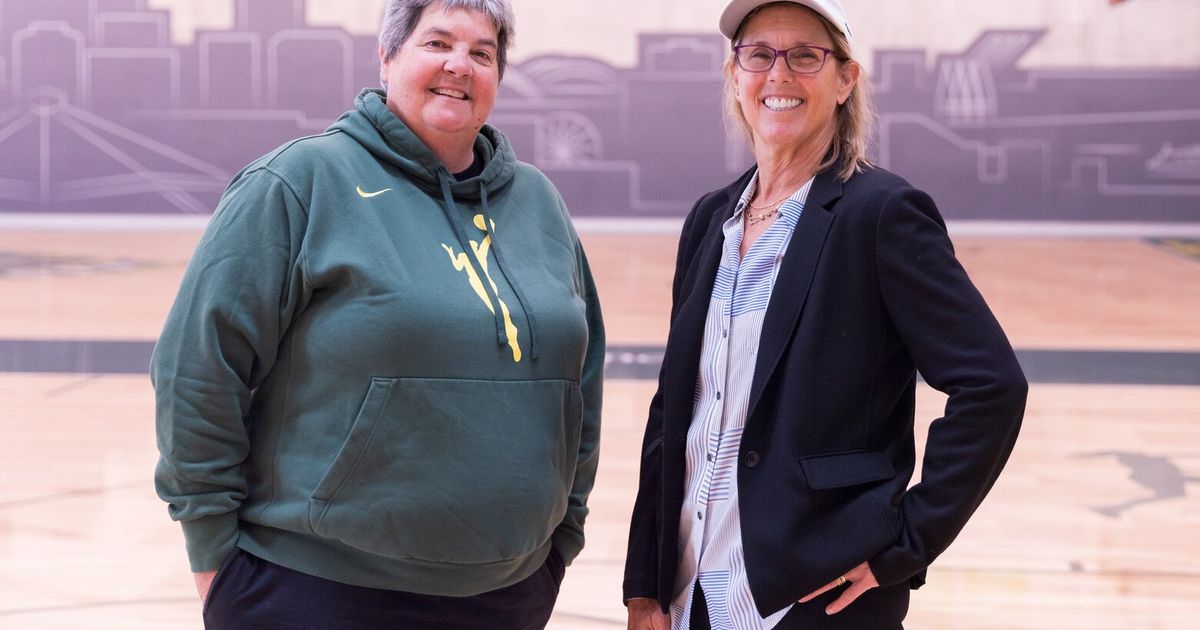Editor’s Note: This story is part of a project recognizing LGBTQ+ people who have shaped Washington ahead of the 50th anniversary of Seattle Pride. Keep an eye out for more in-depth coverage of changemakers through June 30. To read more, click here.
Sixteen years later, Lisa Brummel chuckles and admits it’s somewhat far-fetched how four fans saved the Storm from an uncertain future and built the four-time WNBA champions into one of the top franchises in the league.
“When we all came together, it wasn’t like we were friends,” Brummel said. “It wasn’t like we [all] had ever worked together before, but we had enough connective tissue amongst us, and we had a singular mission that we wanted to get accomplished. It kind of all fell into place.”
Brummel and Dawn Trudeau, who are former Microsoft executives, knew each other during their days at the tech giant. In the mid ‘90s, they partnered with former Seattle Deputy Mayor Anne Levinson in a bid to purchase the American Basketball League’s Seattle Reign before that league went defunct in 1998.
Trudeau and Ginny Gilder, an Olympic silver medalist in rowing and investment CEO, worked together on nonprofit boards. And Brummel and Gilder attended Yale at the same time, but their paths didn’t really cross in college.
When Oklahoma City businessman Clay Bennett bought the NBA’s Sonics and Storm in July 2006 for $350 million, Brummel, Trudeau, Gilder and Levinson partnered to purchase the Storm for $10 million on Jan. 8, 2008.
“It’s an odd thing,” Brummel said. “We didn’t think anything of it. We thought, ‘Yeah, let’s go try this.’ We didn’t do this massive analysis. We didn’t say ‘Oh my God, what if it fails?’
“ … We know we have great fans, and so we just did it.”
From the start, the Storm found a home in the LGBTQ+ community and vice versa.
“One of the things that I experienced as a fan — that is now an underlying tenet of who we are as an organization — was the Storm was always a safe place,” said Gilder, who came out in 1998.
“To this day, we as an organization want to be an inclusive place where it’s not only safe for people to feel like they can be themselves and participate in what’s essentially a community event, but to have a good time being that way.”
And yet, the WNBA, which began in 1997, initially marketed itself to a heterosexual male audience and struggled for years with LGBTQ+ affirmation.
“First and foremost, the Storm lives and has always lived at the intersection of business, sports and social change,” Gilder said. “If you are going to be a female athlete, you were going to have to figure out how to advocate for yourself.
In 2014, the WNBA became the first professional league in the country to celebrate Pride, which was a landmark decision at the time.
Ten years later, the WNBA is arguably the most active league as it pertains to social advocacy, particularly for the LGBTQ+ community.
In 2017, the Storm announced a first-of-its-kind partnership with Planned Parenthood, which included a rally outside of KeyArena and a donation of ticket revenue.
And in 2020, the Storm voiced its support for the 2020 Democratic ticket of Joe Biden and Kamala Harris, becoming one of the few American professional sports teams to publicly endorse a political candidate.
Is it financially risky?
“We really haven’t gotten much pushback to be honest,” Brummel said. “We’re very clear upfront; this is who we are. And if our values align and if our actions align, a partnership is probably really, really smart.”
This season, during the five-game Commissioner’s Cup series, the Storm partnered with Pro-Choice Washington to raise awareness and funds for reproductive freedom and voter engagement.
The Storm was scheduled to host the Dallas Wings on Pride Night, June 29 at Climate Pledge Arena.
“Our goal was to keep this team in the community for our community, where people could come and see great basketball, see great women’s role models, and where we can prove to people that women’s sports was a real viable business,” Brummel said, noting the Storm recently drew a franchise-record-setting sellout crowd of 18,343. “You walk around the arena and you see how many people are coming to the games these days. You see the diversity of people coming to the games these days. You see the acceptance among our fan base of everyone who comes to the Storm games.”










